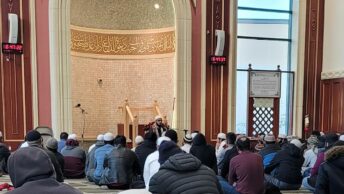Translated by Umer Ansari
There are a few requests I would like to make:
First of all, the detailed technical discussions that take place in the dawrah hadith year are not meant to be memorized verbatim, nor can it be expected that all such details will be remembered forever. Rather, the objective of such discussions is for the students to comprehend the nature of these discussions and get familiarized with the Hadith sciences that will aid them in their future self-study. Hence, the objective of such discussions is to develop within students the eagerness for research. Therefore, students must not suffice with rote memorization of the lectures.
The dawrah hadith students should understand the discussions well and they should critically analyze them according to their individual capabilities. They should dig deeper into the discussions and form questions of their own. The answers to such questions should be sought from their teachers. Secondly, relevant books from outside of the curriculum should be referred upon need. A sign of a good student is that they do not settle in peace until they find answers to the questions that their heart thought of. During the lecture, a teacher presents their own conclusions of their research and study. However, no teacher can claim that they have covered all the possible aspects in their lecture that leaves no room for any question. Students should not settle with a few major principles after they have thoroughly understood their teacher’s lecture. Rather, they ought to develop inerasable desire and unquenchable thirst for knowledge. This is the objective of the discussions in dawrah hadith. If such an unquenchable thirst is not developed then students could successfully complete their exams with rote memorization, but they would have missed acquiring the primary objective.
A second request that I would like to make is that the sole focus of the students nowadays is upon the technical arguments pertaining to hadith, whereas, they do not make an effort in familiarizing themselves with hadith’s matn, even though the nature of such technical discussions is above and beyond the study of the text. The primary focus of the science of hadith is the matn of hadith. Therefore, it is my humble request to the students that they must not neglect the matn while getting tangled up in the intricacies of the lectures. Rather, they must focus on memorizing the matn of hadith as much as it is feasible for them and they should pay close attention to understanding its significance. The lecture is most beneficial when the hadith text is well memorized. Otherwise, an example of a person who indulges in the intricate discussions pertaining to hadith without having understood the words and meanings of it is like a person who beautifies themselves without having worn their clothes. Students must completely abstain from such behavior!
In the end, the most important request is that regardless of the lofty status one acquires in their practical life or expertise in the matn, isnād, and the relevant discussions of hadith, this entire academic discourse is an external mould. If it is not supplemented with actions then such academic endeavor is not worth a dime in front of Allah. The primary objective of studying hadith is to develop a habit of emulating the Sunnah, to awaken the desire for supererogatory actions, to increase the fear of Allah and concern for the Hereafter, to strengthen the connection with Allah and resilience in abstaining from sins, and to increase in the love of Allah and His Messenger ﷺ. If this is not developed during hadith studies then the amount of academic discussions that one has memorized is irrelevant; such a person has not benefited from hadith at all.
Therefore, it is imperative to bring a considerable change in one’s life after entering into the dawrah hadith year. All idle engagements must be completely abandoned and the 24/7 concern should be the rectification of one’s own personality, character, and actions, and how much of our speech and actions conform with the noble seerah that we study day and night. The hadith pertaining to the virtues of deeds is not for mere recitation nor just to mention in the lectures and speeches. Infact, they are for us, to improve our own lives. No other creature will be born to act upon them if we do not practice upon them. Students should pay close attention towards improving their character and practical life and be considerate towards the virtuous and supererogatory actions. Lack of memorization of some of the intricate hadith discussions is not as harmful as having academic expertise in the science of hadith, yet experiencing no change in the personality, character, demeanor, and practical deeds. Allah forbid, if such an academic expertise becomes a cause of pride, vanity, and self-indulgence then there is nothing more devastating. May Allah protect us from such evil. Ameen.
Lastly, I humbly request the students to remember me in their supplications.
Shaykh al-Islam Mufti Muhammad Taqi Usmani, 15th Shawwal, 1400 AH.
Translated by Umer Ansari, 6th Shawwal, 1442 AH / May 18th, 2021 CE.






